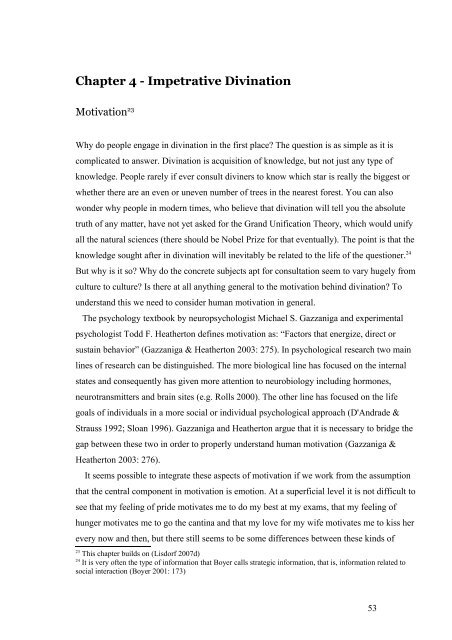The dissemination of divination in roman republican times
The dissemination of divination in roman republican times
The dissemination of divination in roman republican times
Create successful ePaper yourself
Turn your PDF publications into a flip-book with our unique Google optimized e-Paper software.
Chapter 4 - Impetrative Div<strong>in</strong>ation<br />
Motivation 23<br />
Why do people engage <strong>in</strong> <strong>div<strong>in</strong>ation</strong> <strong>in</strong> the first place? <strong>The</strong> question is as simple as it is<br />
complicated to answer. Div<strong>in</strong>ation is acquisition <strong>of</strong> knowledge, but not just any type <strong>of</strong><br />
knowledge. People rarely if ever consult div<strong>in</strong>ers to know which star is really the biggest or<br />
whether there are an even or uneven number <strong>of</strong> trees <strong>in</strong> the nearest forest. You can also<br />
wonder why people <strong>in</strong> modern <strong>times</strong>, who believe that <strong>div<strong>in</strong>ation</strong> will tell you the absolute<br />
truth <strong>of</strong> any matter, have not yet asked for the Grand Unification <strong>The</strong>ory, which would unify<br />
all the natural sciences (there should be Nobel Prize for that eventually). <strong>The</strong> po<strong>in</strong>t is that the<br />
knowledge sought after <strong>in</strong> <strong>div<strong>in</strong>ation</strong> will <strong>in</strong>evitably be related to the life <strong>of</strong> the questioner. 24<br />
But why is it so? Why do the concrete subjects apt for consultation seem to vary hugely from<br />
culture to culture? Is there at all anyth<strong>in</strong>g general to the motivation beh<strong>in</strong>d <strong>div<strong>in</strong>ation</strong>? To<br />
understand this we need to consider human motivation <strong>in</strong> general.<br />
<strong>The</strong> psychology textbook by neuropsychologist Michael S. Gazzaniga and experimental<br />
psychologist Todd F. Heatherton def<strong>in</strong>es motivation as: “Factors that energize, direct or<br />
susta<strong>in</strong> behavior” (Gazzaniga & Heatherton 2003: 275). In psychological research two ma<strong>in</strong><br />
l<strong>in</strong>es <strong>of</strong> research can be dist<strong>in</strong>guished. <strong>The</strong> more biological l<strong>in</strong>e has focused on the <strong>in</strong>ternal<br />
states and consequently has given more attention to neurobiology <strong>in</strong>clud<strong>in</strong>g hormones,<br />
neurotransmitters and bra<strong>in</strong> sites (e.g. Rolls 2000). <strong>The</strong> other l<strong>in</strong>e has focused on the life<br />
goals <strong>of</strong> <strong>in</strong>dividuals <strong>in</strong> a more social or <strong>in</strong>dividual psychological approach (D'Andrade &<br />
Strauss 1992; Sloan 1996). Gazzaniga and Heatherton argue that it is necessary to bridge the<br />
gap between these two <strong>in</strong> order to properly understand human motivation (Gazzaniga &<br />
Heatherton 2003: 276).<br />
It seems possible to <strong>in</strong>tegrate these aspects <strong>of</strong> motivation if we work from the assumption<br />
that the central component <strong>in</strong> motivation is emotion. At a superficial level it is not difficult to<br />
see that my feel<strong>in</strong>g <strong>of</strong> pride motivates me to do my best at my exams, that my feel<strong>in</strong>g <strong>of</strong><br />
hunger motivates me to go the cant<strong>in</strong>a and that my love for my wife motivates me to kiss her<br />
every now and then, but there still seems to be some differences between these k<strong>in</strong>ds <strong>of</strong><br />
23 This chapter builds on (Lisdorf 2007d)<br />
24 It is very <strong>of</strong>ten the type <strong>of</strong> <strong>in</strong>formation that Boyer calls strategic <strong>in</strong>formation, that is, <strong>in</strong>formation related to<br />
social <strong>in</strong>teraction (Boyer 2001: 173)<br />
53


